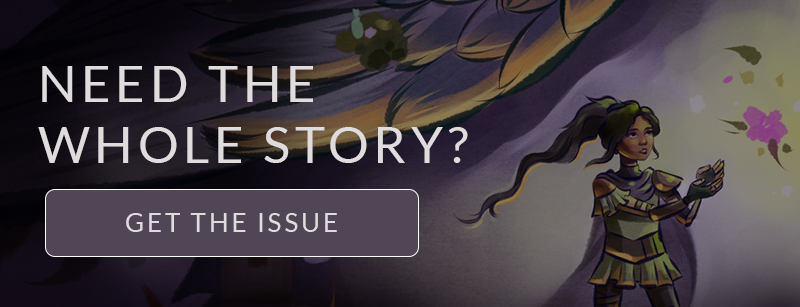This is a sample from Augur Magazine Issue 2.3. The full story can be read by purchasing the issue here.
Remembrance of Worlds Past
by Andrew Wilmot
REMEMBRANCE OF WORLDS PAST
Content warning: illness and death
Mortem simply appeared one day at the outer edge of our solar system. With a mass twice that of Jupiter, the planet—which some feared was a harbinger of doom—had travelled a long way through interstellar space, before arriving at our doorstep.
I can recall that day vividly, despite it being nearly five years ago. It was our generation’s “where were you when” moment—our Berlin Wall, our Challenger explosion, our 9/11. Ariel and I talked about it on our very first date. It was the summer before I left home for university and… I remember watching the press conference with my parents, how it felt like everything should have just stopped. Like, collectively, as a species, our entire trajectory should have changed overnight. Except it didn’t. Ariel said she felt the same. She couldn’t understand why this event, this new knowledge of our universe, of an aspect of life we’d previously imagined but not understood, didn’t alter the course of human futurity right then and there. She said it was if—
“It just happened.” That, from the visibly overwhelmed White House Press Secretary at a press conference on the planet, tasked to be the first to publicly discuss the “event.” That’s what they called it—an antiseptic label for something heretofore unprecedented. The entire world watched that simulcast, from the early morning when an observatory in Australia reported first details of the then-unknown object: a massive entity moving across our solar system with unprecedented speed.
It had passed through Pluto, the Press Secretary stated, his tone very matter-of-fact.
“Pluto’s been obliterated?” said a shocked reporter seated in the front row.
“Through,” they stressed. “It went through Pluto. It hasn’t destroyed anything. This thing just appeared and… we can’t explain it. No matter what we think of it… it shouldn’t exist.”
It shouldn’t, but it does.
***
“Do we have to listen to this?” Ariel reached over and switched off the car’s radio.
She did this all the time—ask me for something, then just take care of it herself. If she ever asked me to give her a hand with the groceries or help clean up around the cottage, by the time I got there it was always too late—she’d gone and done whatever it was she’d tried, pointlessly, to task me with.
Even back in university, I saw it in her. We’d be at her place watching a movie, and she’d reach over while saying, “Can you hand me the blanket?” while already in the process of taking it. I tried once to get her to see what she was doing, how close she cut to her own quick, but she couldn’t—at her worst, she was like a horse with blinders on. Her world was only what she saw directly in front of her.
Christ, it used to get under my skin. I definitely never expected, when everything was done, when she was finally gone, that those parts of her would be among the things I missed most.
Remorse, it seems, is a package deal.
Continued in Augur Magazine issue 2.3…
ANDREW WILMOT is an award-winning Toronto-based author and editor, and copublisher of the magazine Anathema: Spec from the Margins. Their fiction has appeared in a variety of places, both online and in print. Further details at andrewwilmot.ca. Their first novel, The Death Scene Artist, is available from Wolsak & Wynn/Buckrider Books.


